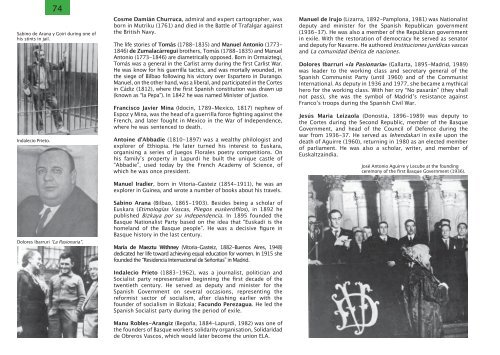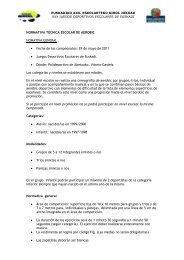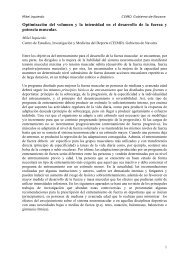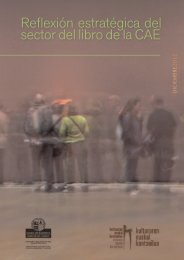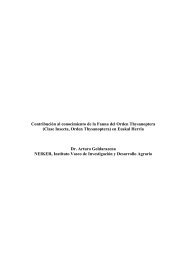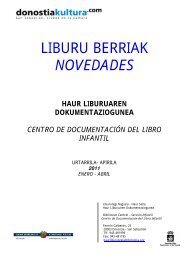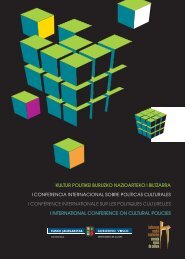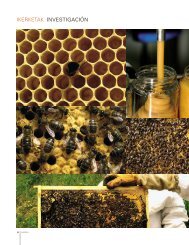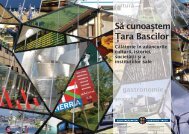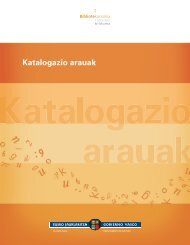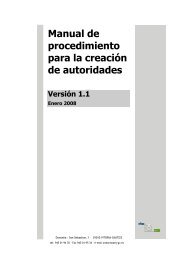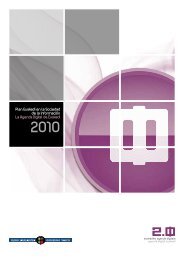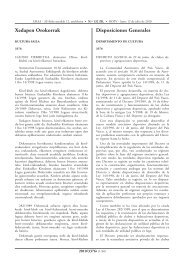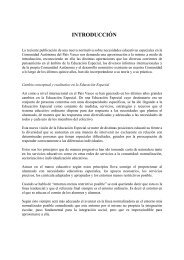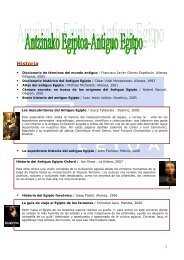The Basque Country (pdf, 4,3Mb) - Kultura Saila - Euskadi.net
The Basque Country (pdf, 4,3Mb) - Kultura Saila - Euskadi.net
The Basque Country (pdf, 4,3Mb) - Kultura Saila - Euskadi.net
Create successful ePaper yourself
Turn your PDF publications into a flip-book with our unique Google optimized e-Paper software.
74<br />
Sabino de Arana y Goiri during one of<br />
his stints in jail.<br />
Indalecio Prieto.<br />
Dolores Ibarruri “La Pasionaria”.<br />
Cosme Damián Churruca, admiral and expert cartographer, was<br />
born in Mutriku (1761) and died in the Battle of Trafalgar against<br />
the British Navy.<br />
<strong>The</strong> life stories of Tomás (1788-1835) and Manuel Antonio (1773-<br />
1846) de Zumalacárregui brothers, Tomás (1788-1835) and Manuel<br />
Antonio (1773-1846) are diametrically opposed. Born in Ormaiztegi,<br />
Tomás was a general in the Carlist army during the first Carlist War.<br />
He was know for his guerrilla tactics, and was mortally wounded, in<br />
the siege of Bilbao following his victory over Espartero in Durango.<br />
Manuel, on the other hand, was a liberal, and participated in the Cortes<br />
in Cádiz (1812), where the first Spanish constitution was drawn up<br />
(known as “la Pepa”). In 1842 he was named Minister of Justice.<br />
Francisco Javier Mina (Idocin, 1789-Mexico, 1817) nephew of<br />
Espoz y Mina, was the head of a guerrilla force fighting against the<br />
French, and later fought in Mexico in the War of Independence,<br />
where he was sentenced to death.<br />
Antoine dʼAbbadie (1810-1897) was a wealthy philologist and<br />
explorer of Ethiopia. He later turned his interest to Euskara,<br />
organising a series of Juegos Florales poetry competitions. On<br />
his familyʼs property in Lapurdi he built the unique castle of<br />
“Abbadie”, used today by the French Academy of Science, of<br />
which he was once president.<br />
Manuel Iradier, born in Vitoria-Gasteiz (1854-1911), he was an<br />
explorer in Guinea, and wrote a number of books about his travels.<br />
Sabino Arana (Bilbao, 1865-1903). Besides being a scholar of<br />
Euskara (Etimologías Vascas, Pliegos euskerófilos), in 1892 he<br />
published Bizkaya por su independencia. In 1895 founded the<br />
<strong>Basque</strong> Nationalist Party based on the idea that “<strong>Euskadi</strong> is the<br />
homeland of the <strong>Basque</strong> people”. He was a decisive figure in<br />
<strong>Basque</strong> history in the last century.<br />
María de Maeztu Withney (Vitoria-Gasteiz, 1882-Buenos Aires, 1948)<br />
dedicated her life toward achieving equal education for women. In 1915 she<br />
founded the “Residencia Internacional de Señoritas” in Madrid.<br />
Indalecio Prieto (1883-1962), was a journalist, politician and<br />
Socialist party representative beginning the first decade of the<br />
twentieth century. He served as deputy and minister for the<br />
Spanish Government on several occasions, representing the<br />
reformist sector of socialism, after clashing earlier with the<br />
founder of socialism in Bizkaia; Facundo Perezagua. He led the<br />
Spanish Socialist party during the period of exile.<br />
Manu Robles-Arangiz (Begoña, 1884-Lapurdi, 1982) was one of<br />
the founders of <strong>Basque</strong> workers solidarity organisation, Solidaridad<br />
de Obreros Vascos, which would later become the union ELA.<br />
Manuel de Irujo (Lizarra, 1892-Pamplona, 1981) was Nationalist<br />
deputy and minister for the Spanish Republican government<br />
(1936-37). He was also a member of the Republican government<br />
in exile. With the restoration of democracy he served as senator<br />
and deputy for Navarre. He authored Instituciones jurídicas vascas<br />
and La comunidad ibérica de naciones.<br />
Dolores Ibarruri «la Pasionaria» (Gallarta, 1895-Madrid, 1989)<br />
was leader to the working class and secretary general of the<br />
Spanish Communist Party (until 1960) and of the Communist<br />
International. As deputy in 1936 and 1977, she became a mythical<br />
hero for the working class. With her cry “No pasarán” (they shall<br />
not pass), she was the symbol of Madridʼs resistance against<br />
Francoʼs troops during the Spanish Civil War.<br />
Jesús Maria Leizaola (Donostia, 1896-1989) was deputy to<br />
the Cortes during the Second Republic, member of the <strong>Basque</strong><br />
Government, and head of the Council of Defence during the<br />
war from 1936-37. He served as lehendakari in exile upon the<br />
death of Aguirre (1960), returning in 1980 as an elected member<br />
of parliament. He was also a scholar, writer, and member of<br />
Euskaltzaindia.<br />
José Antonio Aguirre y Lecube at the founding<br />
ceremony of the first <strong>Basque</strong> Government (1936).


